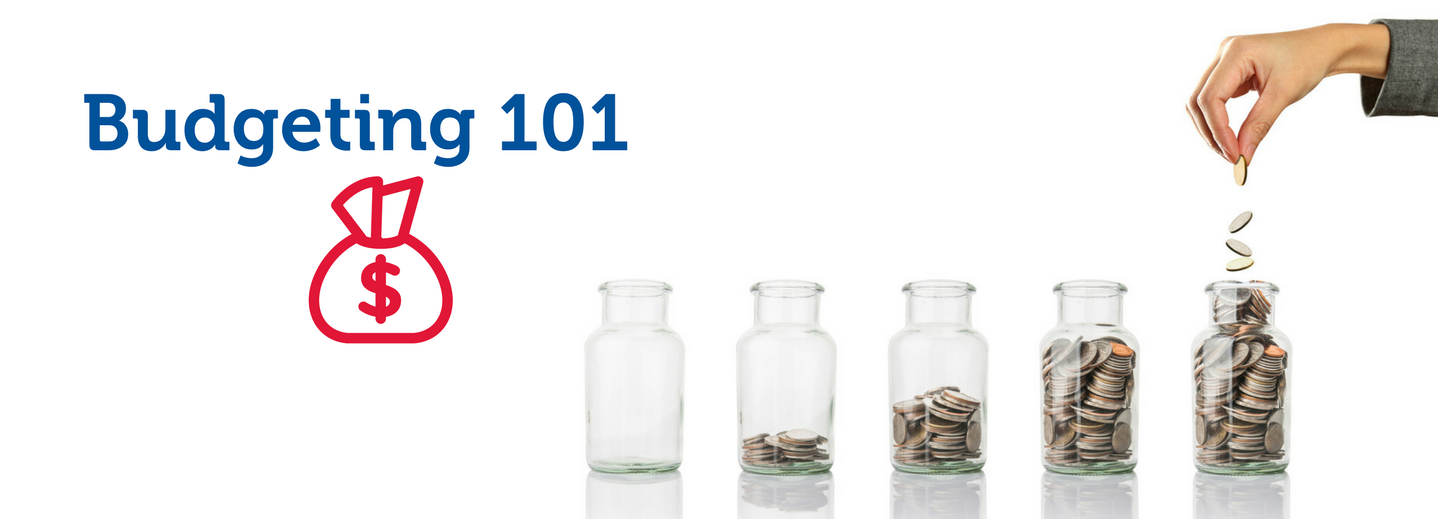Budgeting 101

Having a budget might seem like a restrictive process with rigid limitations, but it’s really just a way to become financially organized. Instead of associating a budget with controlling “bad” spending habits, look at it as the beginning of a journey towards developing your BEST spending habits!
What's Going Out?
When creating your budget, you should start by listing all bills and expenses. Organize your list so that it reads from most to least important as far as payments go, which usually means you’ll have your “fixed” costs (or the ones that typically stay the same every month, such as your mortgage, rent or car loan payment) at the top and the “variable” payments (money for food, clothing, gifts, etc.) near the bottom.
What's Coming In?
Include your salary and whatever else makes up the guaranteed income stream you receive each month. When listing your household income, remember to not account for money unless you’re absolutely sure it’s coming in. Payments you and/or your spouse may get for income, such as tax returns or employment bonuses, are just extra sources of income and should not be relied on each month.
Analyze
After you’ve listed all your expenses and sources of income, total the two and compare their values. From here, you can set financial goals for yourself and see exactly where your strengths and weaknesses lie. Ideally, the more the incoming amount outweighs the expenses, the better! But if you initially find that you’re breaking even (or even spending more than you’re bringing in), don’t stress! The point of a budget is to keep your money organized, managed, stabilized and maintained.
Account For Everything
Although the small purchases you make throughout the month may seem insignificant, that money is equally as important as the rest. Groceries, gas, utilities, even dry cleaning, should all be considered part of your indispensable “bills,” and thus should be included in your budget accordingly. Try and plan for anything out of the ordinary that you’ll have going on throughout the month. Trips, birthday celebrations, holidays...these atypical purchases can really start to add up, so you should budget for them in advance.
Cut back
Now that you see your incoming and outgoing funds, it’ll be much easier to see what unnecessary spending can be eliminated and used to decrease any debt and increase your savings. For instance, if you feel your grocery spending is excessive, work with your family and see what you can agree on cutting out. (For reference, Americans on average spend an estimated 9-12% of income on food). Purchase store/off-brand products whenever possible and always use coupons and/or store discount programs when shopping (such as Target’s Cartwheel app, which lets you choose your favorite deals and scan your phone’s barcode at checkout for instant savings). Every penny counts!
Save
Speaking of savings, you should always view saving money as an essential portion of your budget instead of optional or a luxury. Having a rainy day fund to fall back on in times of emergencies is extremely important, and you should be allocating a set amount to your savings as if it were any other bill! This article recommends saving your income in varying percentages depending on where you are in life: in your 20s, try to save at least 10%; 30s, save 15-25%; 40s, save 25-35%; and so on. Though the situation differs from person to person, you should always plan for at least some of your paycheck to be saved every month. If you’re worried about the temptation to spend your savings, eliminate the opportunity by having those funds go into a separate account, or opt for one that has limited withdrawals and earns interest! There’s nothing wrong with taking extra measures to keep both yourself and your funds in check!
Be Adaptable
Be sure you are reviewing and adjusting your budget each month, as new expenses will undoubtedly arise, you may find you’re able to cut back more and more as time goes on and your habits improve! The first month may require a little more work, so challenge yourself to save all receipts so you can compare them to your budget and plan more strategically for the future!
Remember, budgeting is a crucial aspect of money management and not just for the fiscally delinquent. Regardless of how flawless you may be in the financial management department, there's always room for self improvement.
Download Our Free Budget Worksheet
By Campus USA at 24 Aug 2017, 16:32 PM